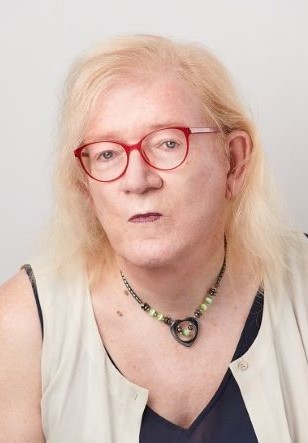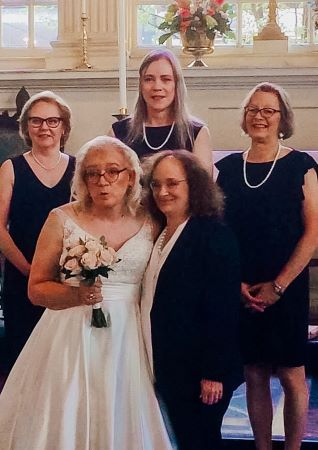Madden '72 reflects on changes for the transgender community
Commercial litigator Maryellen Madden, a longtime advocate and educator for LGBTQ rights, transitioned in 2015 at the age of 67.
Maryellen Madden ’72 brings her personal and professional insights to the issue of transgender legal rights. For decades, she lived her life publicly as a man and a practicing commercial attorney. In 2015, when she was 67, she started living publicly as a woman - an experience that she called “exhilarating.”

Madden has been a longtime advocate and educator for LGBTQ rights, having served on the boards of numerous organizations, including the Transgender Legal Defense and Education Fund (TLDEF) and the Pennsylvania Commission on LGBT Affairs. She has also taught on transgender issues and history in continuing legal education sessions, at bar association forums, and at transgender conferences. She was also a guest lecturer in a course at Duke Law taught by Prof. Carolyn McAllaster about transgender issues.
She also has had a long and accomplished career as a commercial attorney and litigator. Currently in the litigation department at Montgomery McCracken Walker & Rhoads in Philadelphia, her practice focuses on complex litigation and commercial disputes, including securities, corporate governance, real estate, commercial contracts, and health care. She was previously with Buchanan Ingersoll & Rooney.
Madden talked with Duke Law about her personal experiences and the progress made by the transgender community.
You came out as transgender later in life. What was that public transition like for you?
In a word: exhilarating. The fears I harbored of widespread rejection were never realized. The moment I walked out the door of my apartment as Maryellen, I became fearless and filled with a sense of happiness I had not expected. My family life was a much more difficult experience that I am reluctant to share publicly.
Do you feel like you experienced discrimination at work or suffered professional setbacks because of your identity?
No. With only a few exceptions, my colleagues enthusiastically embraced my new identity. By way of contrast, when I encountered difficulties in my private life due to my new identity, my law firm became a place of refuge, and colleagues who had kept their distance before my change became friends concerned for my well-being.
How do you think things have changed for transgender people compared to when you were growing up?
Only a few years ago, transgender men and women who attempted what I did became social outcasts and lost their jobs. The welcoming experience I have encountered simply wouldn’t have happened even 10 years ago. Indeed, transgender men and women were largely ostracized within the LGBTQ community until very recently, and there are still aspects of those prejudices that impact members of our community today.
How have things changed for transgender people in the legal profession? What are some challenges that remain?

My experience notwithstanding, I think the pace of change has slowed. We are still a small demographic, and I am unaware of much progress being made to give young transgender attorneys equal footing in the private sector job market or that anyone is even monitoring what’s happening.
Your legal practice focuses on complex litigation and commercial disputes, but you volunteer on several boards and organizations that deal with LGBTQ issues. How are you using your legal training and experience to try to advance transgender rights or to codify protections for LGBTQ people?
I do not see myself as an activist. I am a trans woman who loves to practice law and who is grateful she still has the opportunity to do so. I work hard and strive to be the best attorney and law colleague I can be. My goal is simple: to demonstrate that transgender men and women can be valued members of the legal community if given the chance.
Who are some legal professionals you admire who are helping to advance the rights of transgender people?
Sara Schnorr was the first transgender attorney in a major firm. She proved it was possible. When I was making my decision to come out, her experience was my beacon of hope. My colleague, Alfred Zaher, has long been active in championing LGBTQ rights, serving as chief diversity officer of my firm and on the boards of the National LGBT Bar Association and the Gay and Lesbian Lawyers of Philadelphia. Alfred took an active interest in my coming out and found time to ensure I was fairly treated. Whatever success I have had in navigating the uncharted waters of gender identity in the legal community was facilitated in no small measure by his advocacy on my behalf. Rachel See, another Duke Law alum, serves as board president of the National Center for Transgender Equality. Rachel is a boundless source of energy in her advocacy for trans rights. Kathy Cooper, new co-chair of TLDEF, is one of the most thoughtful and caring people I know, and I look forward to her work with that organization.
In your opinion, who have been some of the most important transgender rights activists?
There are many, so I will name only a few who influenced me directly or indirectly. Michael Silverman, who founded TLDEF in his Manhattan living room at a time when mainstream LGBTQ organizations shunned transgender men and women. Michael is a true visionary. Clark Pollock, who put together the first organized protest supportive of transgender rights (the 1965 sit-in at Deweys restaurant in Philadelphia) when few others had the courage or inclination to do so. Riki Wilchins helped kickstart transgender advocacy with the formation of Transexual Menace [a transgender rights activist organization]. Tina White is on the board of HRC and serves as director of Blue Ridge Pride. Tina’s book, Between Shadow and Sun: A Husband's Journey Through Gender - a Wife's Labor of Love, makes an important contribution to the literature explaining the trans experience alongside the writings of Deirdre Nansen McCloskey and Jennifer Boylan. Monica Roberts tirelessly used her voice and her blog, TransGriot, to expose violence against the transgender community, especially persons of color. Dr. Admiral Rachel Levine serves as assistant [U.S.] secretary of health and has been a model of courage and professionalism, notwithstanding unrelenting ridicule of her gender identity.
What do you think have been some of the most important legal milestones for transgender people?
I will focus on one: the ability to change names and gender markers. This is fundamental. The recent decision of the State Department to allow individuals to self-select the gender for U.S. passports is a welcomed next step. Likewise, the NYS Gender Recognition Act, which creates processes for transgender and nonbinary New Yorkers to update and obtain accurate identification documents, provides a model that should be replicated in other states. More also needs to be done to include gender identity in nondiscrimination protections that cover the rest of the LGBTQ community.
What is your opinion on the portrayal of transgender people in current popular culture?
Because most people rarely encounter anyone who is transgender, it is easy to create false narratives about us. This is why it is important for trans persons to be visible. The experience of Dr. Levine [who has been subject to ridicule and hateful online commentary] understandably makes many transgender persons hesitant to be open about their gender identity, and some of my transgender friends who have disclosed their gender identity in other parts of the country have found adverse reactions that caused them to regret their decision. Nevertheless, so much has happened so fast that I am optimistic this will self-correct over time. I do not think the clock will be turned back.